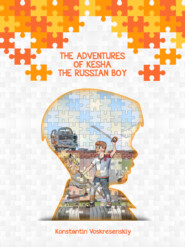
Полная версия:
The Adventures of Kesha the Russian Boy
I was asked a sixth time, and I publicly refused to answer.
«Don't you know?» asked the teacher.
«I know, but you've already tortured me enough. Why do I have to answer every time?» I replied.
«Right, so, obviously, you don't know. Two points.[15]»
During the break, I came up to her to find out what she wanted from me, but she shrugged me off, did not listen, and said that it was impossible to change the grade she's given me. This brought my marks down, and I would be awarded a 4/5 for the term. F**k you… I thought to myself, leaving in silence. Pushkin, Pushkin, Pushkin… I get it, he's our national treasure. But you'd have thought someone else would have written something better by now…
Chapter 6. 1995. First Money
1995. Beer bottles
Pushkin, lifts, and grammar – I had bigger fish to fry. A real man needs money. A lot of money. For… crisps, chupa chups, and a little later for the collectable Teenage Mutant Ninja Turtle stickers.
Сheburashka[16] beer bottles were the answer to our meaningless summer existence and the absence of any pocket money. It made us a little more confident and even more grown-up. It was fun.
Конец ознакомительного фрагмента.
Текст предоставлен ООО «ЛитРес».
Прочитайте эту книгу целиком, купив полную легальную версию на ЛитРес.
Безопасно оплатить книгу можно банковской картой Visa, MasterCard, Maestro, со счета мобильного телефона, с платежного терминала, в салоне МТС или Связной, через PayPal, WebMoney, Яндекс.Деньги, QIWI Кошелек, бонусными картами или другим удобным Вам способом.
Примечания
1
Russian: Константин Дмитриевич Воскресенский
2
Russian: Сергей Сметанин
3
Russian: «Во имя твоё»
4
Russian: Груз 200. A military code word referring to the coffins used to ship Soviet soldiers' coffins home.
5
«Babushka» is Russian for «granny».
6
Russian: Олег Васильевич Кошевой. 8th June 1926 – 9th February 1943. Koshevoy was a Soviet partisan and one of the founders of the clandestine organisation «Young Guard», which fought the Nazi forces in Krasnodon, Ukraine, during World War II.
7
A traditional greeting in some Slavic, Nordic, Baltic, Balkan and Middle Eastern countries
8
A form of collective farm in the Soviet Union.
9
A car designed and manufactured in the Soviet Union.
10
A series of rear-wheel-drive superminis from the Soviet Union.
11
A type of low-cost, brick or concrete-panelled apartment block of three to five floors. They were common in the Soviet Union during the early 1960s, named after then-leader of the USSR, Nikita Khrushchev.
12
A special form of collective justice that existed in the Soviet Union.
13
An old Russian folk sport similar in concept to bowling. The aim of the game is to knock out groups of skittles arranged in various patterns by throwing a bat at them.
14
Your main teacher that stayed with you throughout school, much like a form tutor in the UK.
15
Equivalent to a D in western grading.
16
Also known as «Topple» in earlier English translations. It's a character from Russian children's literature and now a cartoon based on the 1966 story by Soviet writer Eduard Uspenskiy. The bottles were brown, just like Сheburashka, hence why we referred to the bottles this way.
Вы ознакомились с фрагментом книги.
Для бесплатного чтения открыта только часть текста.
Приобретайте полный текст книги у нашего партнера:
Полная версия книги
Всего 10 форматов

